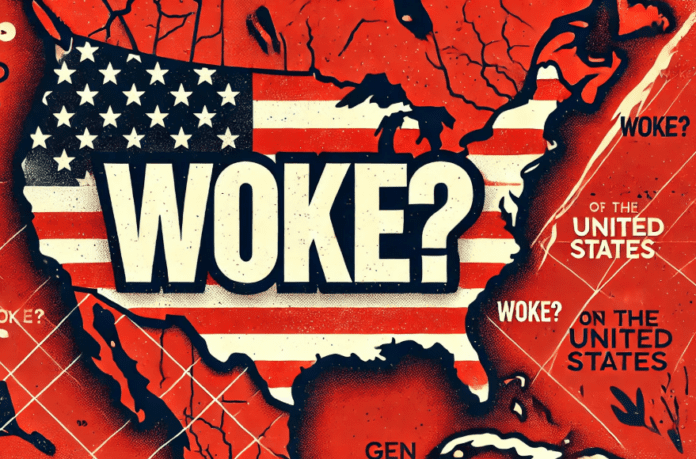The re-election of Donald Trump—or the prospect of it—has sent shockwaves through political and cultural circles, particularly for the movement that has come to define much of Millennial and Gen Z activism: the Woke Initiative. Often misunderstood, “Woke” is a term rooted in awareness of social injustice and systemic inequality. But its modern incarnation has expanded to encompass a wide range of progressive causes, from racial justice and climate change to LGBTQ+ rights, particularly the transgender movement.
For Trump, Elon Musk, and their supporters, “Woke” isn’t a rallying cry but a symbol of overreach, a threat to freedom of speech, and a divisive cultural battleground. If Trump’s policies and rhetoric once paved the way for the anti-Woke backlash, what does his return mean for this polarizing movement?
What Does Being “Woke” Actually Mean Today?
To many supporters, Woke is about being vigilant against injustice, fighting for marginalized groups, and pushing for systemic change. It’s a call for inclusivity and accountability—values that resonate deeply with younger generations.
But critics argue that the movement has overstepped. They claim it promotes a stifling culture of censorship, social division, and even “reverse discrimination.” On platforms like X (formerly Twitter), Elon Musk regularly mocks the Woke agenda, calling it “a mind virus” and advocating for a return to what he terms “common sense.” His disdain is echoed by Trump, who has lambasted the Woke movement as an existential threat to American values.
Why the Right Pushes Back on Woke Culture
For conservatives, the Woke movement embodies everything they fear about cultural progressivism. They see it as moral authoritarianism, where dissent is punished and alternative viewpoints are silenced. Tucker Carlson, one of Trump’s staunchest media allies, frequently warns about what he calls the “weaponization of wokeness” to undermine traditional values.
The Right’s opposition is also pragmatic. Many feel that Woke policies harm small businesses, push ideological agendas in schools, and alienate mainstream Americans. Even moderate Democrats have expressed discomfort with how far-left activists have taken certain initiatives, arguing that they risk losing touch with average voters.
Social Media Influencers: The Culture War’s Frontline
Social media influencers—especially those aligned with the Right—have become the Woke movement’s most visible opponents. Figures like Joe Rogan and Andrew Tate wield enormous influence, using platforms like X and YouTube to criticize Woke ideology. Rogan has called it “overcorrection,” while Tate derides it as “weakness parading as virtue.”
On the other side, progressive influencers like Hasan Piker and Contrapoints rally their audiences to defend Woke ideals, accusing anti-Woke rhetoric of being a cover for regressive politics. The digital battlefield is alive with meme wars, heated debates, and viral moments that make the Woke conversation a defining issue of our time.
The Transgender Movement: The Woke Lightning Rod
Few issues illustrate the Woke divide more starkly than the transgender movement. For advocates, trans rights are a vital part of broader social justice. The push for gender-neutral language, increased visibility, and legal protections is celebrated as overdue progress.

But opponents have weaponized the trans movement as the ultimate symbol of Woke overreach. Trump’s policies banning trans individuals from serving in the military, paired with his vocal disdain for “radical gender ideology,” have made trans issues a centerpiece of the cultural clash. Elon Musk added fuel to the fire, criticizing trans health care for minors and calling for parental rights over what he terms “experimental procedures.”
This tension is further amplified by influencer culture. Figures like Jordan Peterson, who opposes compelled speech related to gender pronouns, have become heroes to the anti-Woke crowd. Meanwhile, transgender activists like Dylan Mulvaney (@dylenmulvaney) and Laverne Cox use their platforms to normalize trans identities and push back against the hostility.
The Woke Movement’s Crossroads
With Trump and his allies seemingly emboldened, the Woke Initiative faces a defining moment. Will it double down on its progressive agenda, risking further polarization? Or will it adapt, finding common ground with moderates and critics?
For Millennials and Gen Z, this is more than a political debate—it’s a question of identity. Woke culture has shaped how we think, speak, and fight for change. But as Trump, Musk, and their supporters push back, the movement must grapple with its future.
Can Woke culture survive the return of Trumpism? Or will it evolve into something new—something that can weather the storm of political backlash without losing its soul?
Let’s hear from you, our readers: What’s your take on the Woke movement in the Trump era? Is it a fight worth continuing, or is it time for a reset? Drop your thoughts below or join the conversation on X with #WokeUnderFire.





